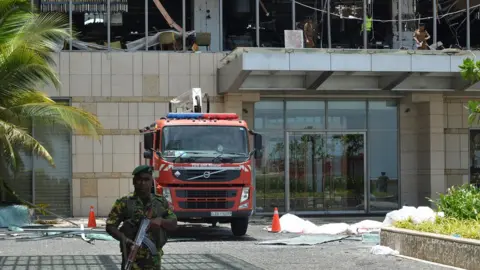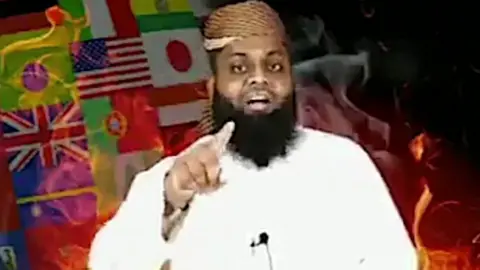Sri Lanka attacks: Who were the bombers?
Two of the nine bombers in Sri Lanka were the sons of a wealthy and well-known spice trader, local police sources have told the BBC.
All but one of the nine have been identified and most came from "middle or upper middle class" families.
Sri Lankan officials suspect a previously little-known Islamist group called the National Thowheed Jamath (NTJ) but UK officials have told the BBC they think it is highly likely that the Islamic State group (IS) was linked in some way.
Some 32 Sri Lankan nationals are known to have joined IS in Iraq and Syria.
As the sweeping investigation into the Easter Sunday bombings - which hit churches and hotels, killing at least 250 people - continues, here is what we know about the suspects.
Spice trader's sons
Two of the bombers were the sons of spice trader Mohammad Yusuf Ibrahim who is based in the Sri Lankan capital, Colombo.
One of them detonated his explosives at the city's Shangri-La hotel while breakfast was being served. The other targeted the restaurant at the high-end Cinnamon Grand hotel which is a short distance away.
Their father has been arrested and is now in custody.
His daughter-in-law detonated explosives during a police raid at the family's villa on Sunday, apparently to avoid arrest.
Several people, including children and police officers, were reportedly killed in that blast.
 Getty Images
Getty ImagesThe family's wealthy background matches the description of the attackers given by the authorities.
"They are financially quite independent and their families are quite stable financially," Deputy Defence Minister Ruwan Wijewardene said at a press conference on Wednesday.
Former student
One of the attackers studied in the UK, officials say.
Abdul Latif Jamil Mohammed visited south-east England in 2006-7 to study but did not complete a full university degree, a senior Whitehall official told the BBC.
He reportedly studied aerospace engineering at Kingston University.
He later studied in Australia before returning to Sri Lanka.
"I can confirm the suicide bomber had been in Australia," Australian Prime Minister Scott Morrison said on Thursday. "They departed in early 2013."
He added: "They had a spouse and child visa at that time as well but they had not returned to the country."
Suspected ringleader
Islamist preacher Zahran Hashim, who founded the NTJ but was reportedly later expelled from the group, is suspected of having been the bombers' ringleader. He blew himself up at a hotel in Colombo.
An IS video that was released after the group said it had carried out the attacks appears to feature him prominently.
In the video, he can reportedly be seen pledging allegiance to the group's leader, Abu Bakr al-Baghdadi.

The UK government believes it is highly likely IS were linked to the bombings although the full extent of the group's role is not clear, officials have told the BBC.
Sri Lanka's Muslim community have said they warned the authorities about him for years prior to the attacks.
"This person was a loner and he had radicalised young people," Hilmy Ahamed, vice-president of the Muslim Council of Sri Lanka, told AFP news agency,
"Nobody thought these people were capable of carrying out an attack of such magnitude."
Zahran Hashim's sister told the BBC: "I came to know about his actions only through the media. Even for a moment, I never thought that he would do such a thing.
"I strongly deplore what he has done. Even if he is my brother, I cannot accept this. I'm not worried about him anymore."
